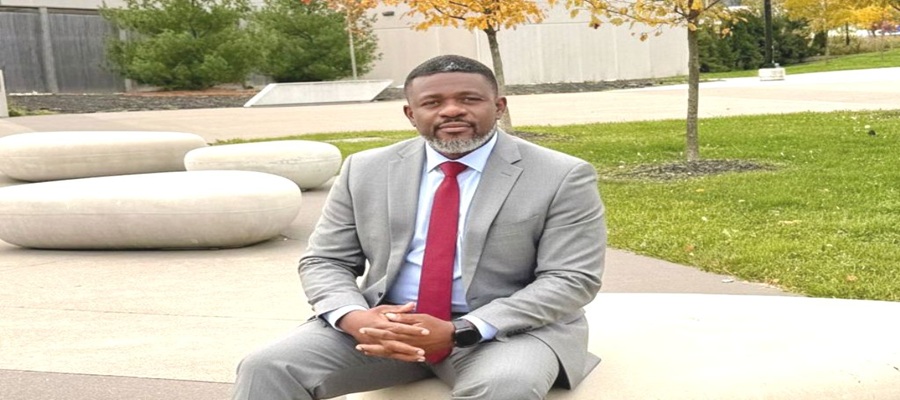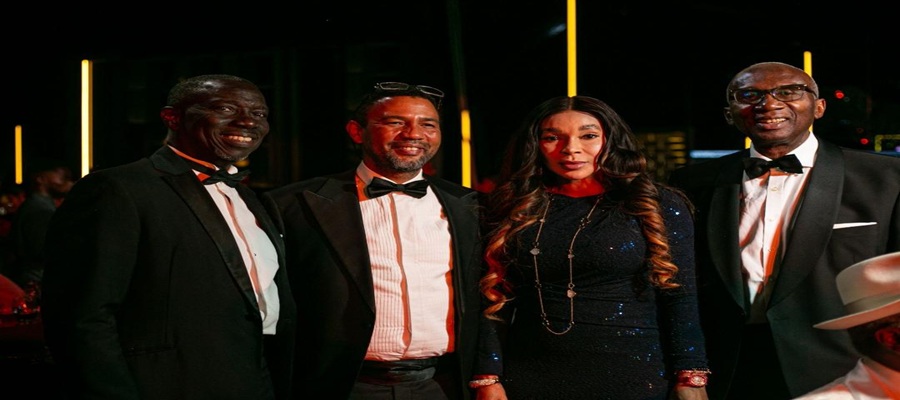Telecom
Microsoft Africa Development Center Set to Connects Azure Developers in Africa through Virtual Event

Microsoft Africa Development Center, the premier engineering center for Microsoft is organizing a free virtual event as part of its ADC’s user group series themed Azure Developers Connect for Developers and Software Engineers in Africa scheduled to hold on the 24th of February, 2022.

The event which would be held virtually is targeted at Azure user groups & communities, developers, engineers, working professionals; Tech communities in West Africa and Kenya in a bid to expose them to the many capabilities of Azure for building next-gen apps and driving global transformation as a developer or software engineer in Africa.
Microsoft Azure is Microsoft’s public cloud computing platform that provides a wide range of cloud services such as computing, analytics, networking, and storage.
Microsoft Azure helps developers and software engineers to develop new applications or even upscale existing applications with its various cloud services. The public cloud computing platform is flexible and open which makes it globally recognized to developers and software engineers due to reliability.
Developers and software engineers would enjoy practical sessions with Top Azure experts, as well as get insights into existing cloud features, they never knew were in existence. Speakers at the event will include Scott Hunter (VP DIR Program Management, Azure Applications, Microsoft) Matt Soucoup (Senior Cloud Advocate, Microsoft) Donald Okafor (Principal Software Engineering lead, Microsoft ADC) Kehinde Ladipo (Software engineer, Microsoft ADC) and other Microsoft ADC software Engineers.

The event would also serve as a great way for developers and software engineers to network with other Azure professionals in the field.
Developers and Software Engineers in Africa can book their seat by registering with the link https://aka.ms/AzureDevelopersConnect to get an in-depth knowledge about exploring the Microsoft Azure Platform and its existing features whilst they prepare to build next-gen apps that would drive global transformations.
Telecom
Nnaemeka Ani – The Architect of ‘Code and Courage’

In the rapidly evolving landscape of African technology, few figures bridge the gap between high-level research and grassroots digital execution as effectively as Nnaemeka Ani.

Nnaemeka Ani
As the Founder of MGX Research Center and the visionary behind MexyGabriel, Ani has emerged as a leading protagonist in the narrative of Nigeria’s technological self-reliance.
The Visionary: Founding MGX Research
At the heart of Ani’s philosophy is MGX Research, a center dedicated to “first-principles thinking.” Under his leadership, the center has become a beacon for data-driven innovation, moving beyond the “hype” of the tech world to focus on persistent, localized solutions.
Through MGX Research Center, he is building a multidisciplinary ecosystem that cuts across artificial intelligence, data science, cybersecurity, smart cities, digital identity, e-governance, EdTech, HealthTech, robotics, and automation
Ani’s mantra – “Africa’s rise begins with its own innovation” – is not just a slogan; it is a call to arms for African builders to stop seeking international validation and start authoring their own digital destiny.
As Founder and CEO of MexyGabriel Tech Company, Nnaemeka has driven multiple large-scale technology projects across Nigeria, focusing on digital infrastructure, enterprise solutions, identity and payment platforms, and youth-centered innovation programs. MGX Research Center functions as the research and development arm of this broader ecosystem, providing the thinking laboratory, prototypes, and strategic insights that inform products, policies, and investment decisions.
Nnaemeka is passionate about youth empowerment, innovation, and Africa’s digital future. His work through MGX Research Center aims to position Nigeria not just as a consumer of technology but as a creator of solutions, producing world-class research, thought leadership, and practical tools that can be deployed across states, universities, and private organizations.
He frequently collaborates with universities, government ministries, tech hubs, and global partners, championing a model where research is not locked up in theory but translated into deployable systems, smart policies, and scalable ventures.
Ani has demonstrated a unique ability to turn complex code into commercial and social value. His work has focused on:
- Infrastructure for Good: Developing platforms that bridge the divide between urban tech hubs and rural communities.
- Sovereign Technology: Championing the idea that African data should be managed by African-built systems.
The Public Servant: Digitizing Enugu State
Ani’s influence extends into the corridors of power. Serving as the Special Adviser to the Enugu State Governor on ICT, he has been instrumental in transforming the state into a burgeoning digital ecosystem.
His work in Enugu serves as a blueprint for “Governance-Tech Synergy,” proving that when political will meets technical expertise, public service delivery can be revolutionized.
“We are no longer just ’emerging’; we are competing. Africa will rise by code, by courage, and by us,” said Nnaemeka Ani.
Quick Facts: Nnaemeka Ani
Category | Detail |
Current Roles | Founder, MGX Research; Founder, MexyGabriel; SA on ICT to Enugu State Governor. |
Core Philosophy | “First-Principles Thinking” – Breaking problems down to their core truths. |
Key Advocacy | Digital Sovereignty, Sovereign AI, and localized STEM education. |
Notable Mantra | “By Code and By Courage.” |
Why He Matters in 2026
As Nigeria enters a transformative year marked by the January 1, 2026 Tax Reforms and the push toward 70% Broadband Penetration, Ani represents the “New Guard” of leadership. He is one of the few voices consistently advocating for the Tripod Method, balancing technology, local policing, and traditional authority, to ensure that Nigeria’s digital growth is matched by national security.
Nnaemeka Ani is not just as a “tech guy,” but as a Strategic Reformer. He is a “Leader to Watch” because he understands that for technology to thrive in Nigeria, it must be supported by sound policy and cultural relevance.
Telecom
MTN Nigeria Appreciates Partners, Customers at Lagos Prestige Experience

MTN Nigeria has hosted the Prestige Experience, a refined evening of culture, connection and celebration, as part of its ongoing Y’ellotide initiative marking the Yuletide season.

MTN Nigeria
The event, held on Friday at The Royal Box, Victoria Island, Lagos, brought together customers, partners, stakeholders, and dignitaries in an atmosphere of appreciation and festivity.
The Prestige Experience showcased Nigerian creativity and elegance through a curated blend of fine dining, fashion, and music. Guests were treated to Michelin-inspired cuisine prepared by renowned Chef Stone, fashion showcases highlighting African heritage, and soulful performances by acclaimed singer Asa.
The evening was anchored by popular hosts Ebuka Obi-Uchendu and Michelle Dede, with comedic interludes from veteran comedian Alibaba.
Speaking at the event, Dr Ernest Ndukwe (OFR), Chairman of MTN Nigeria, described the gathering as an expression of gratitude and partnership. He said the Prestige Experience reflected MTN’s appreciation for the trust Nigerians continue to place in the brand.
“The MTN Prestige Experience is a cornerstone of our commitment to you, our valued partners. Your trust and continued patronage are the bedrock of our success, and this gathering reflects our appreciation for that trust.
“We are not just a service provider but are committed to being a trusted partner in Nigeria’s progress,” Ndukwe said.
In his remarks, Dr Karl Toriola, Chief Executive Officer of MTN Nigeria, emphasised the importance of genuine connection during the festive season.
“We recognise the immense value of the relationships we have built together, and we are committed to ensuring that your experience remains unparalleled.
“You are essential partners in our journey, and we look forward to many more years of shared success and collaboration,” Toriola said.
Distinguished guests at the event included members of MTN’s Board and Executive Management, industry leaders, government officials, members of the diplomatic community, and representatives from the creative sector, reflecting the diversity and richness of the MTN ecosystem.
The Prestige Experience forms part of MTN’s broader Y’ellotide celebrations, which reaffirm the company’s belief that meaningful connections and shared experiences remain central to its relationship with Nigerians.
Telecom
Google Finally Allows Users to Change Gmail Address, Keeps Data and Services Intact

Google has unveiled a new feature that allows Gmail users to change their existing email addresses without losing data or access to services, marking a major shift in the company’s long-standing policy.

Gmail
According to an update on Google’s account help page, the new option enables account holders to replace their current @gmail.com address with a new one while retaining all associated data, including emails, photos, and integrations with services such as Google Drive, Maps, and YouTube.
The guidance, however, was first spotted on the Hindi version of Google’s support page, suggesting that the rollout may begin in India or Hindi-speaking markets before expanding globally.
The English-language support page still carries the older advisory that Gmail addresses “usually cannot be changed.”
Google explained that under the new policy, users who update their Gmail address will automatically keep their original address as an alias.
This means emails sent to the old address will continue to arrive in the inbox, and the original address will remain valid for signing in to Google services.
Previously, users seeking a new Gmail address had to create an entirely new account and manually transfer their data, a process that often disrupted third-party app integrations. The new feature eliminates that inconvenience, ensuring continuity for users.
The company further clarified that while users can reuse their old Gmail address at any time, accounts that change their address will face certain restrictions.
These include a 12-month waiting period before another new Gmail address can be created, and the inability to delete the newly chosen address once it has been set.
Google assured users that all existing data would remain intact after an address update, including stored photos, messages, and emails.
The gradual rollout of the feature indicates that full global adoption is expected in the coming months, a move likely to be welcomed by millions of users who have long requested the ability to update their Gmail identities without starting afresh.

 Telecom2 days ago
Telecom2 days agoGoogle Finally Allows Users to Change Gmail Address, Keeps Data and Services Intact

 News2 days ago
News2 days agoInsomniaQ Spotlights African Creativity in Lagos

 General News2 days ago
General News2 days agoT2 Backs Youth Excellence as NCBC Wins Bosun Tijani Foundation Basketball Tournament

 E-Financial23 hours ago
E-Financial23 hours agoNigeria’s N58.18trn Budget and Rising Cost of Deficit Governance

 Telecom23 hours ago
Telecom23 hours agoNnaemeka Ani – The Architect of ‘Code and Courage’

 Telecom23 hours ago
Telecom23 hours agoMTN Nigeria Appreciates Partners, Customers at Lagos Prestige Experience


















